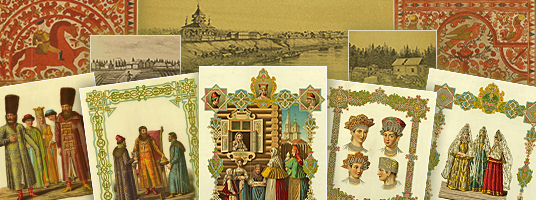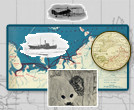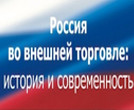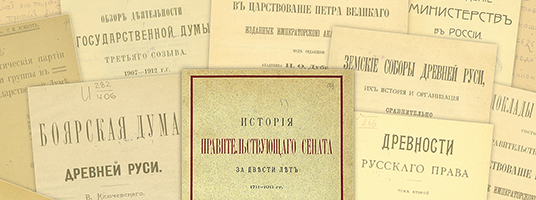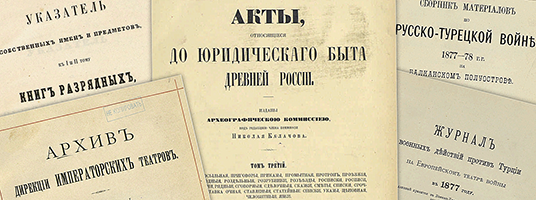Topics
Free Economic Society for the Encouragement of Agriculture and Husbandry (1765–1917)
The Imperial Free Economic Society is the oldest public organization in Russia and the first scientific and educational society, which has been spreading knowledge about agriculture, production, and processing of agricultural products since 1765. The society was under the patronage of Russian emperors and contributed to the establishment of new scientific fields in Russia.
Cultural Heritage of the Peoples of Russia
The cultural heritage of the people of the Russian Federation is a unique historical and cultural asset that reflects the ethnographic, socio-cultural, and ethnogenetic aspects of past generations' lives. Preserving this heritage and sharing it with the general public is essential for shaping national identity, preserving cultural diversity, and passing on values to future generations.
Russian Military Historical Society
The digital collection dedicated to the Russian Military Historical Society contains both modern official documents and materials from the early 20th century history of the organization. These include instructions, circulars, regulations, meeting logs, official correspondence, collections of published materials, newspaper articles, and materials from regional branches of the society. Additionally, there are publications and periodicals related to military history.
Russian Geographical Society
The digital collection dedicated to the Russian Geographical Society (RGS) contains texts of charters, regulations, lists of members, surveys of individual members, expedition reports, travel descriptions, and reviews of society's work on history, ethnography, geography, and other sciences. It also includes bibliographic indexes, scientific monographs, abstracts of dissertations, catalogues of books from the society's library, descriptions of manuscripts, scientific archive with a list of funds, archival files including memoirs, personal correspondence, and various administrative, financial, and economic documents, as well as exhibition materials, cartographic materials, and visual materials.
Cathedral of Christ the Savior in Moscow
The collection of documents is dedicated to the history of the construction and restoration of the Cathedral of Christ the Savior in Moscow. It includes various materials such as plans, drawings, photographs, and descriptions of the monumental paintings that adorn the interior of the church. Additionally, the collection features documents from different archives, including the Russian State Historical Archive, the State Archive of the Russian Federation, and the archives of the Artillery Historical Museum, the Samara Regional Scientific Library, and private collections. These documents provide a comprehensive view of the history and significance of this iconic building.
Private Libraries of Russia
Private book collections from the 18th and 19th centuries are an integral part of Russian and global culture. Each of these libraries is a unique testament not only to the taste of their owners, but also to a particular historical period, and they serve as a crucial repository of the generations' spiritual heritage.
At present, it is particularly important to return to cultural values from the past and appreciate the centuries-long history of our nation. Personal libraries, as a part of Russian culture, play a significant role in this process.
Development of Siberia and Far East
The collection is dedicated to two priority areas of modern Russia's development: the territories of Siberia and the Far East. These regions will determine the country's geo-economic future. The collection contains historical evidence from the XVI century onwards, including accounts of the pioneering explorers who ventured into these uncharted lands. It includes scientific monographs, publications from the East Siberian branch of the Russian Geographical Society and the Imperial and Soviet academies of sciences, as well as reports from research expeditions and works of art. The collection also includes cartographic, audio-visual, and visual materials.
St. Petersburg State University
To mark the 300th anniversary of St. Petersburg State University, the Presidential Library has prepared a special collection that celebrates not only the main stages of the university's founding, but also the history of its organization and certain aspects of its scientific and educational activities throughout its history. The collection includes official and statutory documents, historical notes and memoirs of contemporaries, monographs and abstracts, archival files, as well as periodicals of the university and visual materials.
Obukhov Plant: from the history of the formation of domestic industry
The Сollection contains materials covering the main stages of the history of the creation and activity of the Obukhov plant in St. Petersburg from the XIX century to the present. The Collection includes official documents, archival files from the holdings of the Council of Ministers (1905-1917), the holdings of the Council of People's Commissars of the USSR and others, monographies, letters, resolutions, etc., as well as pictorial and cartographic materials.
Youth in Russia: Past and Present
The collection reveals the history of relations between the state and youth in Russia. Supporting young people in their desire for creative activity, taking into account their needs and interests, has been one of the priorities of the authorities in Russia at all times.
Zemsky Sobors in the history of Russian statehood
The collection consists of such archival sources as official acts of all Moscow Zemsky Sobors of the 16th – 17th centuries, letters, petitions, as well as monographs, reviews, and other materials on the study of this issue in Russian and Soviet historical science.
Grand Duchy of Lithuania
The collection marks the history of the emergence and main stages of development of the Grand Duchy of Lithuania in the 13th–16th centuries. It includes research, thesis, essays and notes on the western outskirts of Russia, collections of documents (scribal books, charters, monuments of diplomatic correspondence, genealogy, etc.), cartographic and visual materials.
Administrative Directorate of the President of the Russian Federation: the Past and the Present
The collection includes decrees, orders, coronation collections, various archives (reviews, reports, orders, circulars, instructions, collections of resolutions, official letters, duty journals, telegrams, reports, notifications, memos, appendices, inventories, etc. ); as well as dissertation research, historical essays, indexes, photographs and newsreels.
Family and traditional family values in Russia as the basis of Russian statehood
The collection marks the history of a family and family values. Much attention is paid to the preservation and strengthening of family values. Decree of the President of the Russian Federation of November 9, 2022 № 809 “On Approval of the Fundamentals of State Policy for the Preservation and Strengthening of Traditional Russian Spiritual and Moral Values” classifies “a strong family” as a traditional value.
Happy International Women's Day!
The collection dedicated to International Women’s Day presents Soviet postcards of the 1950s and 1960s. They reflect the meaning and content of this holiday in Russia in various periods: the struggle of women for their rights and emancipation, international women’s solidarity, as well as the established tradition of giving flowers to women on March 8, in which, in addition to men, children also take part.
On this festive day, which marks the beginning of spring, we congratulate all women – mothers, sisters, grandmothers, daughters, wives, work and study colleagues – and wish them health, love, joy, prosperity and creative achievements!
Pioneer Organization in Russian History
The collection contains official documents, archival materials, research works, methodological manuals, photographs, postcards, posters, notes revealing various aspects of the activities of the Pioneer Organization, including in the Union republics of the USSR.
Formation of the Union of Soviet Socialist Republics
The collection, timed to coincide with the 100th anniversary since the signing of the Declaration and Treaty on the Creation of the USSR, includes documents, archival materials and newsreels, dedicated to the signing of the Declaration and Treaty on the Creation of the USSR, the First All-Union Congress of Soviets, the process of forming the all-Union legislation and new authorities, as well as the formation of new Union republics in the 1920s-1930s.
Russian state and the economy of Russia
The collection features the studies and documents on Russian economy since the times of Ancient Rus’. The collection’s materials depict the development of domestic and foreign trade, the specifics of the agrarian and industrial development of Russia, the work of state bodies in the economic and financial spheres, the economic changes during Soviet time, including the time of the Great Patriotic War, as well as the current state of Russian economy and aspects of foreign economic activity.
World War II in archival documents (collection of digitized archival documents, film and photo materials)
On September 4, 2025, the Сollection of digitized archival documents, film and photo materials World War II in Archival Documents, posted on the Presidential Library portal was replenished with 250 new documents from federal and departmental archives of Russia, which cover the events of the period from June 25 1945.
The first general census of the population of the Russian Empire in 1897
The collection dedicated to the First General Census of the Russian Empire includes materials about the preparation and holding of the census and its results for various regions and individual groups of the population.
Russian inventions: Pages of history
Year 2021 has been declared the Year of Science and Technology in Russia. The collection, marking this event, features official documents, archival materials, research papers and video films, dedicated to the history of Russian inventions.
Russian Academy of Sciences
The collection is devoted to the Russian Academy of Sciences, the largest centre for fundamental scientific research and practice. It features current official documents, archival materials, research on the history of the Academy, literature indexes, anniversary publications, graphic materials, works of members of the Academy of Sciences and its periodicals.
Russian Cossacks
The collection is devoted to the history of the Russian Cossacks. It features research papers, reference books, popular historical essays of the XIX – early XX centuries, statutes and regulations, archive materials, maps, plans and drawings, modern official documents. They reveal the culture of the Cossacks, the history of the formation of the Cossack hosts and the Cossack service, including the history of the participation of the Cossacks in World War I, the 1917 Revolution and the Civil War in Russia. The revival of the traditions of the Cossacks in the Russian Federation is also highlighted.
History of statistics of the Altai (Mining) District
The collection is devoted to the development of the system of state and zemstvo statistics in Western Siberia and the activities of the Statistical Department under the General Directorate of the Altai District. The collection features digital copies of statistical studies, archival materials and scientific publications.
State Duma in the history of Russian statehood
The collection marks the 115th anniversary of the First Duma of the Russian Empire. It comprises the constituent documents, archival materials, political writings, research, verbatim records of meetings, reviews of activities and illustrative materials.
Governing Senate in the history of Russian statehood
The collection marks the 310th anniversary of the establishment of the Governing Senate. It features studies, reports, decrees and orders, reference publications, archival documents and graphic materials that represent the activities of the Governing Senate from the XVIII century to the beginning of the XX century.
Rare books of the Presidential Library
The presented collection features selected rare books from the collection of precious books of the XVI–XX centuries, donated to the Presidential Library in May 2009. The collection includes unique documents: foreign books before 1700, and domestic publications before 1830, the first or lifetime editions of Russian classics, the best examples of decorated and illustrated books, etc.
State Hermitage Museum
The collection, which is built up ahead of the 255th anniversary of the State Hermitage Museum, contains publications on the history of the museum and its art collection; archival materials, which spotlight the history of the development of the Hermitage collection throughout the 19th century, the museum staff, the institution’s publishing activities and other issues; visual materials (postcards and photographs with views of the Hermitage buildings, its halls and collections; a documentary film about the museum and historical newsreel footage.
St. Petersburg Bridges
The collection, which is dedicated to bridges of St. Petersburg, contains cartographic materials (bridge design drawings, drawings of their parts, plans of the city, which show the location of bridges), visual materials (photographs and postcards with views of bridges, bridge structures, construction and restoration of bridges), archival papers on the allocation of funds for the maintenance of bridges and other documents.
Year of Theatre in Russia
Year 2019 has been declared the Year of Theatre in Russia. The collection, marking this event, features official documents, archival materials, research papers, periodicals, visual and audiovisual resources that reflect various aspects of the development of theatre in Russia – from the history of theatre in pre-Petrine Rus to the current search for new forms and genres. The highlight of the collection is sections, dedicated to individual theaters and figures – actors, directors and other representatives of theatrical professions.
Saint Isaac’s Cathedral
The collection dedicated to Saint Isaac’s Cathedral consists of descriptions of the church, archival documents (including plans and technical drawings), which spotlight the history of its construction and activities, as well as visual materials featuring views of the cathedral in different historical periods.
Presidential Library: Yesterday, Today, Tomorrow
The Presidential Library, which has a status of the national library of Russia, was opened on May 27, 2009. It is the national electronic repository of digital copies of the most important documents on history, theory and practice of Russian statehood, Russian language, and also the multimedia multifunctional (cultural, educational, research, information and analytical) center. A special collection has been prepared to mark the 10th anniversary of its opening. It is dedicated to the history of the library’s foundation, collection acquisition policy, development of the regional network, scientific and methodological, educational and cultural activities, as well as the cooperation between the Presidential Library and organizations in Russia and abroad. The collection comprehensively presents documents and materials of various types, which spotlight the development of the library from the moment when the decision on its foundation was taken in 2007.
Summer Garden
The collection dedicated to the Summer Garden - one of the most famous park ensembles in Russia, includes postcards, books and archival documents.
Imperial Archaeological Commission
The Imperial Archaeological Commission was founded on February 15, 1859 by Alexander II. It existed until 1919, when its functions were entrusted to the Russian Academy of the History of Material Culture. The commission became the first state archaeological institution in the country. The practices of the Commission formed the basis of the modern regulation of archaeological research and the system of protection of monuments in Russia. The collection, dedicated to the 160th anniversary of its foundation, includes publications of the commission, as well as archival documents on its establishment and development.
Council Code of 1649 (Sobornoye Ulozheniye)
The collection includes 17th-20th-century editions of the first printed (typographic printing technique) code of laws of the Russian state – the Council Code of Tsar Alexei Mikhailovich (Sobornoye Ulozheniye), regional excerpts from the document and the researches into history and law dating from the 17th century.
Peter the Great Museum of Anthropology and Ethnography (the Kunstkamera) of the Russian Academy of Sciences
The Kunstkamera, founded in 1714, is the first state public museum in Russia. Established in 1879 the Museum of Anthropology and Ethnography (MAE) became the successor to the Kunstkamera. Today, the MAE holds over 1.2 million items. One of the world’s largest ethnographic, anthropological and archeological collections is housed in the institution. The collection includes studies, guidebooks, archival documents, maps and visual materials that give an insight into the history of the museum - its foundation, organization of activities, staff expansion and new acquisitions.
Saint-Petersburg State University of Culture
The collection, built up ahead of the 100th anniversary of the foundation of Saint-Petersburg State University of Culture includes unique archival and visual materials, provided by the educational institution, which cast light on the history of its long-standing effective work of training specialists in the field of culture and arts.
Rossica
The collection includes publications of foreigners dedicated to Russia during 10th – 19th cc. - memoirs, diaries, reports, accounts and other documents, which represent the most important sources of social history of Russia and give an insight into the Russian society from foreigner perspective. Apart from works of foreigners, the collection features pre-revolutionary, Soviet and modern studies, materials of scientific collections, reprinted maps and plans.
Year of Volunteers in Russia
Year 2018 has been declared the Year of Volunteers in Russia. The collection, marking this event, features official documents, research papers, reports of volunteer communities, archival cases and photographs that reveal various stages in the development of the volunteer movement in Russia.
Komsomol in the national history
The collection, timed to coincide with the centenary of the All-Union Leninist Communist Youth League (the Komsomol), presents publications of the 1920s - 1940s, which cast light on the history of the Komsomol, its goals and basic activities; Komsomol periodicals, which came out during the Great Patriotic War, visual materials of the 1950s – 1990s, which show Komsomol members during different periods of the national history.
Saint-Petersburg College of Architecture and Civil Engineering
The collection, timed to coincide with the 110th anniversary of St. Petersburg College of Architecture and Civil Engineering, contains unique documents and photographs, which illustrate the activities and the history of one of the oldest educational institutions in St. Petersburg.
State regulation of water biological resources
History of the Moscow Kremlin
The collection presents studies of the late 19th - early 20th cc., which cast light on the history of the Moscow Kremlin and its sights; archival materials, which spotlight the restoration of the Kremlin buildings in the Russian Empire; plans and technical drawings, including those that documented how the Kremlin was destroyed in 1812; along with albums, photographs and postcards with views of the Kremlin and Red Square covering different periods.
Sport in Russia
The collection features official documents, archive materials, studies, educational material, reference and visual materials, periodicals reflecting the history of sports development in our country. The section is emphasized on football. The creation of this section is timed to the holding of the 2018 FIFA World Cup in Russia. The section includes both historical and modern materials. In particular, the photographs showing the construction of stadiums in Russian cities hosting matches of the world championship are widely represented.
Russian voyages around the world in the first half of 19th century
The collection timed to coincide with 215th anniversary of the first Russian circumnavigation of the world, provides access to research works, archival documents from the Foreign Policy Archive of the Russian Federation and the Russian State Historical Archive, video and visual materials. The collection comprises general geographical studies on voyages around the world, works of members of the first expedition: Ivan Krusenstern, Yuri Lisyansky, Nikolai Rezanov, Fyodor Shemelin, and members of other voyages as well: Otto von Kotzebue, Faddey Bellingshausen and Fyodor Litke. The collection spotlights the archival documents: instructions and letters given to the expedition members, materials which focus on publication of research works of participants. A separate section provides an insight into the service and scholarly work of expedition members after the voyages. The collection also contains images of monuments to Ivan Krusenstern and Mikhail Lazarev.
Archaeographic Commission
The collection includes publications of the Archaeographic Commission (1836—1931), amassed basing on the analysis of bibliographic indexes and stocks of the major Russian libraries. These documents have not lost their relevance and scientific value until now, taking into account that many sources were published only in the editions of the Archaeographic Commission.
Russian America
Featured collection includes the archival materials and the studies that tell about the North American territories that were part of the Russian Empire in the XVIII and the XIX centuries, a history of their discovery and development, the activities of the Russian-American Company and the Russian Orthodox Church in North America.
Development of the Arctic
The collection includes research works, essays, memoirs, archival files, official documents, newsreels, photographs and other materials that tell about the arctic travels and expeditions, the Arctic Ocean, the adjoining territories, and the lives of their inhabitants, the development of polar lands from ancient times to the present. There is a section on the Northern Sea Route, which played a significant role in the development of the Arctic; as well as materials of art exhibitions related to the North.
Orthodox Russia. Monasteries and icons
The proposed collection is dedicated to a difficult period in the history of Russian monasticism – the XVIII–XIX centuries. In medieval Europe, monasteries were centers of writing, repositories of cultural and material values. Civilians hid behind their thick walls during wars and civil conflicts. The collection includes research, archival materials, and illustrated publications.
Legal System in Russia
The collection contains documents, which spotlight the development of law in Russia during different historical periods. They include historical texts of legal acts, as well as studies in the field of law. The materials are arranged thematically and chronologically. The retrospective study is represented by sections focused on Ancient Russia, the Russian Empire and the Soviet state. The current state of the legal system in the Russian Federation is viewed through the prism of scientific research. In addition, there is a section of legal periodicals in the collection. The collection is being developed.
Most Holy Governing Synod in the history of Russian statehood
The collection includes the research studies, legal documents, sources of personal origin, social and political journalism, drafts and blueprints, photographs and postcards, as well as periodicals on the history of the Holy Synod − the supreme authority of the ecclesiastical and state administration of Russian church in 1721-1917 years.
Russia in the Foreign Trade: Past and Present
December 1, 2012, for the first time in history, the Russian Federation took over the G20 presidency - the leading forum for international cooperation on the most important aspects of the international economic and financial agenda. One of the priorities of Russia’s G20 presidency is to strengthen multilateral cooperation to find global solutions to the current economic challenges and risks. Establishing mutually favorable foreign trade regimes is in the common interest of the G20 countries and is essential for the rapid recovery of the global economy.
Chernobyl: In Commemoration of the Tragedy
The collection timed to the anniversary of the Chernobyl tragedy, the largest technological disaster in the history of the world nuclear power, includes official papers, regulatory documents, studies, methodological and visual materials, as well as a publication of the early 20th century, which describes a tour of the Pripyat to inspect ancient monuments in the town of Chernobyl.
Establishment and work of state institutions in Russia
The collection contains books which demonstrate the establishment, formation, development and work of state institutions in Russia. The significant contribution of Russian Emperors to the formation of the statehood, the influence of historical events on the work of institutions is fully reflected in the collection.
Source study in prerevolutionary Russia
This collection includes authentic materials, reflecting different historical epochs of Russia, which can be used for written sources study.
History of education in Russia
The collection is dedicated to the history of the development of the education system in Russia, state policy in the field of education and enlightenment from the times of Ancient Rus' to the present, including the process of formation of educational institutions in the provinces, as well as modern federal districts. The collection involves materials about the evolution of teaching methods, the history of the creation and functioning of the most significant educational institutions, as well as biographies of outstanding teachers and mentors.
History of Russian Army
This collection includes books about formation, development, and reformation of the Russian Army.
History of the Russian Orthodox Church
This collection includes books, which focus the reader’s attention on the origin and establishment of the Russian Orthodox Church. These are, first and foremost, fundamental works by the historians and prominent figures of the Church.
Politics and power
This collection includes the works about the development of Russian and foreign politology. One of the most important parts of the collection are the books, which describe the Russian Empire's most important elements of power, and its political system.
Tolerance: View of the Russian History and Culture
The collection includes modern sociological studies, which reveal the concept of tolerance, philosophical works of the 19th century, which trace the origins of this problem, and historical materials on the reign of Peter I, illustrating various aspects of social life at that time.
Marking the Year of Russian Cinema
Year 2016 has been declared the Year of Russian Cinema. The collection, marking this event, features official documents, research papers, various visual materials (playbills, posters, postcards, etc.) that reveal various aspects of the development of Russian cinema since the early XX century and present individual films and actors of Russian and Soviet cinema.
Constitution – Basic law
Since 1918 the Constitution has been the basic law of our country. Texts of constitutions of the Russian state in different historic epochs along with commentaries on these texts are represented by two sets, which show the development of constitutions in the Soviet time and at the modern stage.
History of Drafting and Adoption of the Constitution of the Russian Federation
The unique collection of documents from the Presidential Library’s holdings contains digital copies of official documents, as well as studies, publicistic works, memoirs, videos related to the final stage of work on the draft Constitution of the Russian Federation in 1993.
Legal state in Russia. History and modern times
The collection includes selected works covering the formation of state law in Russia, the government system, development of ideas of legal state, justice.
Electoral System in Russia: Past and Present
An important tool in the implementation of democratic foundations of the state are the elections. Participation of citizens in the elections shall guarantee them the protection and consideration of their interests. In 2012, a single voting day was established, in anticipation of which in 2016 the Presidential Library prepared a thematic collection, "The Electoral System in Russia: History and Modernity." The collection includes more than 200 units and provides a comprehensive view of the history of formation of electoral law in our country, and also covers its current status. The collection includes both historical sources relating to the right to vote (official and archival documents), as well as research works.
Institute of Presidency in Russia
The collection includes legislative acts, studies, manuals, video records, texts of addresses, and other materials related to the activities of the President of the Russian Federation and the bodies ensuring his work.
Russian Historical Society
The digital collection is built of the archival documents, reflecting various aspects of the accomplishments of the Russian Historical Society, of the materials from the individual archive its chairman, the Secretary of State and a member of the National Council A. A. Polovtsov. A full set of collected works released by the society during its existence is also included.
Law and Information: Modern Research
The collection timed to the traditional international scientific-practical conference "Law and Information: Theory and Practice" includes studies covering the specified topic in general, as well as its particular areas such as copyright, legal regulation of the mass media and information security.
Fact and Image of the Russian History in the Works of Russian Writers
To celebrate 2015, the Year of Literature, the Presidential Library has developed a new digital collection of materials "Fact and image of Russian history in the works of Russian writers." It presents the views of authors on the history of Russia in the 16th - early 20th centuries. Particular emphasis is placed on the literary works covering the reign of Ivan the Terrible, the formation and flourishing of the Russian Empire in the 18th – early 20th century, the War of 1812, the socio-economic and socio-political development of Russia in the 19th - early 20th centuries. The collection contains the first publications of works, books about the life and work of such writers as Alexander Pushkin, Feodor Dostoyevsky, Leo Tolstoy, Anton Chekhov and others/ as well as their portraits.
West-Siberian Railway
Olympic Games in Collectibles
The collection includes digital copies of various types of objects, united by the Olympic themes, which enable to preserve the memory of important sporting events. There are 178 units (badges, stamps, coins, postcards, programs, tickets and etc.) with the image of traditional Olympic symbols, mascots of the Olympics, certain sports, participants and winners of the competitions. The bulk of the collection is dedicated to the XXII Olympic Summer Games of 1980 - the first Olympic Games that took place in our country. To develop the collection the library has used materials from private collections and from the Children's Museum of Postcards.
Outer Space
More than half a century ago the dream of mankind to come out of the Earth has come true. This great event is devoted to a collection that includes fragments of newsreels, periodicals, books, postcards, commemorative medals and badges - reflecting various milestones in the development of space exploration.
Kronstadt – the city of Russian naval glory
Designed by Peter I for the marine protection of Petersburg, Kronstadt has repeatedly carried out its mission. The proposed collection consists mainly of archival documents on the issues of construction and on the development of certain aspects of the port city in the late 18th - early 20th centuries.
St. Petersburg and Russian Avant-Guard
Collection, developed jointly by the Presidential Library and the State Russian Museum, is dedicated to the G-20 summit in Russia. The collection includes general research on the history of Russian avant-garde, exhibition catalogs and albums covering this art phenomenon, works on some of its representatives. Of particular interest are materials that characterize the spirit of the age. Among them there are newsreels showing Petrograd in the first quarter of the 20th century, rare postcards depicting mass celebrations decoration in the avant-garde style, autobiographic text of V. V. Kandinsky (1918) and the libretto of the opera "Victory over the Sun" by A. Kruchenykh ( 1913).



